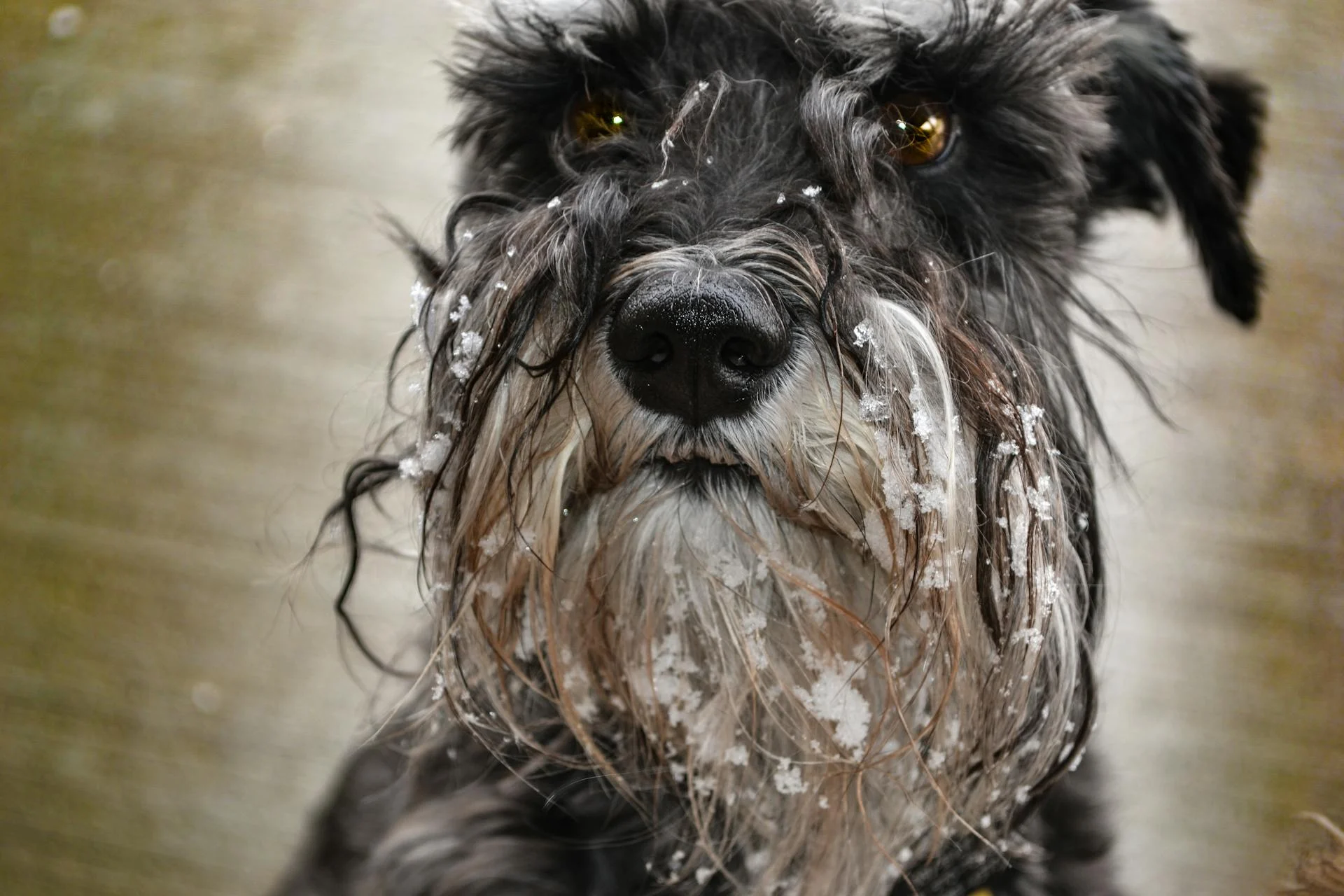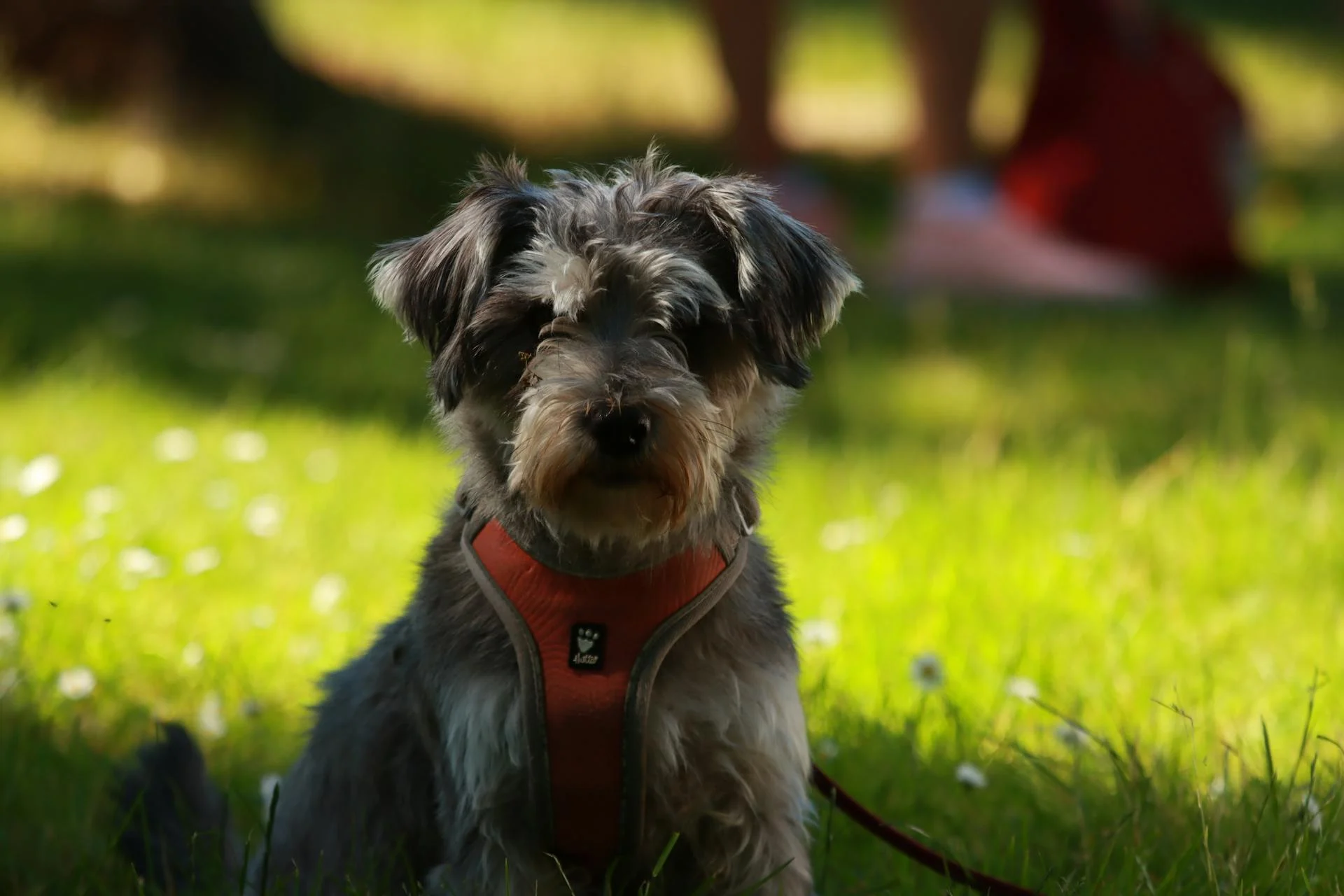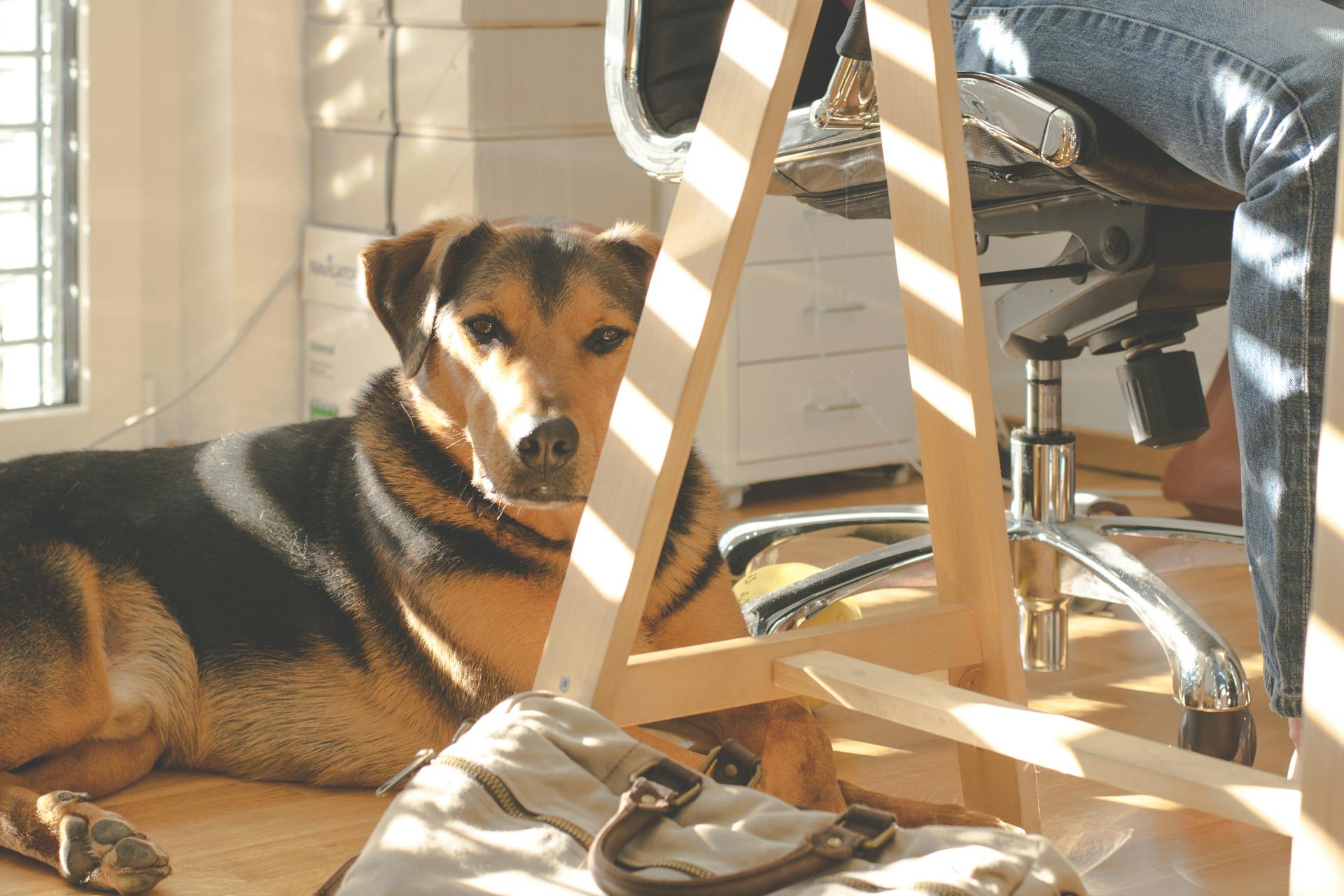
The Standard Schnauzer is a beloved breed known for its intelligence, loyalty, and distinctive beard. They are generally a healthy breed, but like all breeds, they can be prone to certain health issues.
Hip dysplasia is a common problem in the Standard Schnauzer, causing arthritis and mobility issues later in life. Regular exercise and a balanced diet can help maintain joint health.
Obesity is another issue that can affect Standard Schnauzers, particularly if they don't receive enough physical activity. Keeping them trim through a combination of exercise and a healthy diet is crucial.
Eye problems, such as cataracts and progressive retinal atrophy, can also affect the breed. Regular eye exams can help detect these issues early on.
Expand your knowledge: Dog Breed Health Problems
General Information
Brushing your dog's teeth daily will prevent periodontal disease. This simple habit can make a huge difference in your Standard Schnauzer's overall health.
Regular exercise is essential for maintaining a healthy weight and preventing obesity in Standard Schnauzers. Aim for at least 30 minutes of moderate exercise per day.
Standard Schnauzers are prone to eye problems, including cataracts and progressive retinal atrophy. Regular eye exams can help identify these issues early on.
Keeping your Standard Schnauzer's coat clean and well-groomed can prevent skin infections. Regular bathing and trimming can also help reduce shedding.
Expand your knowledge: Are Standard Schnauzers Good Guard Dogs
Health Issues
Standard Schnauzers are prone to various health issues, including allergies, which can cause skin irritations. These allergies can be triggered by environmental factors, making it essential to monitor your dog's skin health.
Epilepsy is another common condition that affects Standard Schnauzers, causing recurrent seizures due to an abnormality in the brain. Early detection and treatment can help manage the condition.
Bladder stones are a common issue in Standard Schnauzers, with struvite stones often caused by bladder infections. These stones can usually be treated with antibiotics, but calcium oxalate stones may require surgery.
Here are some common health issues that affect Standard Schnauzers:
- Allergies
- Epilepsy
- Diabetes
- Pancreatitis
- Bladder Stones
- Portosystemic Shunts (PSS)
- Myotonia
Regular check-ups and diagnostic tests can help detect health issues early on, such as cancer, which is a leading cause of death in older dogs.
Infections
Standard Schnauzers are susceptible to bacterial and viral infections, just like any other dog, including parvo, rabies, and distemper.
Many of these infections are preventable through vaccination, which we will recommend based on the diseases we see in our area, heritage, and other factors.
Explore further: Ear Infections in Goldendoodles
Heart Disease
Standard Schnauzers are prone to life-threatening heart conditions that can affect their quality of life. Dilated cardiomyopathy, or DCM, is a condition where the heart becomes large, thin, and weak, making it hard to pump blood to the body.
As this condition advances, your dog may act weak or tired, faint or collapse, breathe in a labored way, or cough. It's essential to catch this condition early, which is why regular check-ups are crucial.
Pulmonic stenosis is another heart condition that can affect Standard Schnauzers. This disease causes a partial obstruction of blood flow from the heart to the lungs, making the heart work harder to pump enough blood.
If your dog has pulmonic stenosis, he may faint or seem to run out of energy during exercise. He may also have difficulty breathing, cough, or not grow as much as he should.
For your interest: Doberman Pinscher Heart Problems
Liver Problems
Liver problems in Schnauzers can be a serious concern. They are more likely than other dogs to have a liver disorder called portosystemic shunt (PSS). This condition occurs when some of the blood supply that should go to the liver goes around it instead, depriving the liver of the blood flow it needs to grow and function properly.
Consider reading: Liver Schnauzer Puppies
Miniature Schnauzers are 19.8 times more likely than all other breeds to be at risk for PSS. If your friend has PSS, his liver cannot remove toxins from his bloodstream effectively.
Symptoms of PSS may include stunted growth or seizures, and if you notice these symptoms, it's essential to test his blood and possibly conduct an ultrasound scan of his liver.
Surgery may be needed to treat PSS, but in some cases, a special diet and medication can help manage the condition.
See what others are reading: Liver Miniature Schnauzer
Cancer
Cancer is a leading cause of death in older dogs, and Standard Schnauzers are more prone to it due to their longer lifespan.
Many cancers can be cured by surgically removing them, so early detection is critical.
Hemangiosarcoma is a type of bleeding tumor that affects Standard Schnauzers at a higher than average incidence, often forming in the spleen.
These tumors can be large, sometimes volleyball-sized or larger, before signs of sickness show, making them difficult to detect.
Consider reading: What Do Miniature Schnauzers Die from
Unbeknownst to pet owners, the tumor can break open and internal bleeding occurs, making it essential to have your Schnauzer's blood tested and an ultrasound performed at least yearly.
Tumors, both benign and cancerous, can look like anything, making it crucial to have all lumps and bumps checked out.
Mast cell tumors are a particularly nasty type of skin cancer found more often in Standard Schnauzers, and the sooner they are surgically removed the better.
Early detection and removal is critical, as many cancers are cured by surgically removing them.
Common Problems
Standard schnauzers are prone to several health issues that you should be aware of. Allergies can cause skin irritations in schnauzers, so be prepared for potential skin problems.
Epilepsy is another common condition in schnauzers, characterized by recurrent seizures. This can be a challenging condition to manage, but with the right care and attention, many schnauzers lead happy and healthy lives.
Recommended read: English Bull Terrier Skin Problems
Diabetes is a serious health issue that can affect schnauzers, causing their body to produce too little insulin or have an abnormal response to insulin. Pancreatitis, which is inflammation of the pancreas, can also occur in schnauzers.
Here are some common health problems in standard schnauzers:
- Allergies
- Epilepsy
- Diabetes
- Pancreatitis
It's essential to work with a reputable breeder who can provide you with a clean bill of health for your pup's parents. This can help you prepare for potential health issues and ensure your schnauzer receives the best possible care.
Your
Your schnauzer's health is a top priority, and it's essential to be aware of the common problems that can affect this breed.
Miniature schnauzers are 19.8 times more likely to be at risk for portosystemic shunts, a liver condition that can be life-threatening if left untreated.
Bladder stones are another issue that can affect your schnauzer, especially miniature schnauzers, due to a breed-related weak urinary tract.
A fresh viewpoint: Miniature Schnauzer Breed Standard

Your schnauzer may be prone to allergies, which can cause skin irritations and discomfort.
Epilepsy is a common condition in schnauzers, resulting in recurrent, unprovoked seizures due to an abnormality in the brain.
Your schnauzer may also be at risk for pancreatitis, an inflammation of the pancreas that can occur suddenly or persistently.
Here are some common health issues to look out for in your schnauzer:
- Allergies
- Epilepsy
- Diabetes
- Pancreatitis
- Bladder Stones
- Portosystemic Shunts (PSS)
- Myotonia
Your chosen breeder should be able to provide paperwork showing a clean bill of health for your pup's parents, so be sure to ask about this when selecting a breeder.
Obesity
Obesity is a serious health problem in Standard Schnauzers that can cause or worsen joint problems.
It may also lead to metabolic and digestive disorders, back pain, and heart disease.
Giving your Standard Schnauzer leftover people food and doggie treats can "love her to death" and contribute to obesity.
Instead, show her love and affection through activities like giving her a hug, brushing her fur or teeth, playing a game with her, or taking her for a walk.
Parasites
Parasites can be a major problem for Schnauzers, with worms and bugs like fleas, ticks, and ear mites infesting their skin and ears.
Drinking unclean water, walking on contaminated soil, or being bitten by an infected mosquito can all lead to parasites getting into your Schnauzer's system.
Hookworms, roundworms, heartworms, and whipworms can cause pain, discomfort, and even death in dogs.
It's essential to test for these parasites on a regular basis to ensure your Schnauzer's health and safety.
Preventive medication can be recommended to keep your Schnauzer healthy and free from parasites.
Dental and Oral Health
Dental disease is the most common chronic problem in pets, affecting 80% of all dogs by age two, and Standard Schnauzers are more likely than other dogs to have problems with their teeth.
Your Standard Schnauzer's teeth will start to show signs of tartar build-up, which can progress to infection of the gums and roots of the teeth. This can lead to a range of serious health issues, including damage to the kidneys, liver, heart, and joints.
If left untreated, dental disease can cut your Schnauzer's life span by one to three years. Regular teeth cleaning and good oral hygiene at home can help prevent or treat dental disease.
On a similar theme: Von Willebrand Disease in Doberman Pinschers
Dental Disease
Dental disease is a common chronic problem in pets, affecting 80% of all dogs by age two. Your Standard Schnauzer is more likely than other dogs to have problems with her teeth.
Tartar build-up on the teeth is the first sign of dental disease. If left untreated, it can progress to infection of the gums and roots of the teeth.
Regular dental cleanings can help prevent dental disease. We'll clean your dog's teeth regularly and let you know what you can do at home to keep those pearly whites clean.
If dental disease is not prevented or treated, your dog will lose her teeth and be in danger of damaging her kidneys, liver, heart, and joints.
For your interest: Canine Distemper Teeth
Eye Problems
Eye problems can have a dramatic impact on your dog's quality of life. Standard Schnauzers can inherit or develop a number of different eye conditions.
Cataracts are a common cause of blindness in older Standards. We'll watch for the lenses of his eyes to become more opaque. Many dogs adjust well to losing their vision and get along just fine.
For another approach, see: Dog Eye Discharge after Boarding
Dry eye, also known as keratoconjunctivitis sicca or KCS, is common in Standard Schnauzers. This painful condition results in sore, itchy eyes and infections. A thick discharge, squinting, pawing at the eye, or a dull, dry appearance of the eye are symptoms to look out for.
Distichiasis is a condition caused by extra hairs that grow inside of the eyelid and rub on the surface of the eye. This painful condition can cause corneal ulcers and chronic eye pain if left untreated. Several treatment options are available, and the prognosis is good once the hairs have been permanently removed.
Dental Abnormalities
Dental Abnormalities can be a common issue in dogs, especially purebreds like your Standard, which are often genetically induced.
Teeth abnormalities can range from an overbite or underbite, also known as a malocclusion or bad bite.
Oligodontia is a condition where only a few teeth are present.
Misaligned teeth can cause problems and may need to be corrected with braces or extractions, yes, dogs can get braces!
We'll be keeping a close eye on your buddy's developing teeth to ensure they stay healthy.
Check this out: Schnauzer Teeth
Care and Lifestyle

As a Standard Schnauzer owner, you know that taking care of your furry friend requires attention to detail and a commitment to their well-being. Regular veterinary check-ups are crucial, so be sure to stick to the recommended schedule of examinations and vaccinations.
Brushing your Schnauzer's coat is a must, especially for their wiry double coat. This should be done at least weekly, and twice a year, stripping or clipping is required to keep them looking their best.
Standard Schnauzers are prone to serious dental problems, so brushing their teeth at least three times a week is a must. This will help prevent painful and costly dental issues down the line.
In addition to regular grooming, a consistent diet is essential for your Schnauzer's health. Feed a high-quality diet appropriate for their age, and avoid giving them people food altogether.
Exercise is also vital for your Schnauzer's physical and mental health. Regular walks and play sessions will keep them happy and healthy, and they're well-suited to apartment life as long as they get enough physical activity.
A unique perspective: Why Does My Female Dog Keep Licking Herself

To keep your Schnauzer's mind and body active, consider enrolling them in dog sports like agility, obedience, or flyball. These activities will provide them with the exercise and mental stimulation they need to thrive.
Here's a quick rundown of the essential care tasks for your Standard Schnauzer:
- Brush their coat at least weekly
- Brush their teeth at least three times a week
- Clean their ears weekly
- Provide regular exercise and mental stimulation
- Stick to a consistent diet
- Visit the vet regularly for check-ups and vaccinations
By following these simple tips, you'll be well on your way to raising a happy and healthy Standard Schnauzer.
Sources
- https://www.embracepetinsurance.com/dog-breeds/standard-schnauzer
- https://foreverfreckled.com/schnauzer-health-problems/
- https://iheartdogs.com/schnauzer-health-problems-lifespan-temperament-maintenance/
- https://kirkwoodveterinaryhospital.com/client-resources/breed-info/standard-schnauzer/
- http://www.shanaschnauzers.com/index.php
Featured Images: pexels.com


